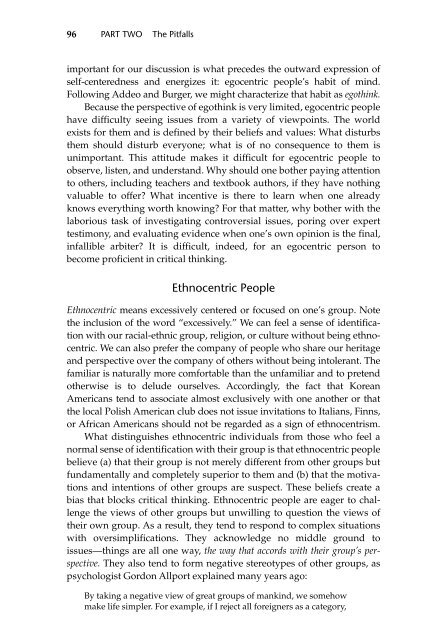Beyond Feelings
Beyond Feelings
Beyond Feelings
Create successful ePaper yourself
Turn your PDF publications into a flip-book with our unique Google optimized e-Paper software.
96 PART TWO The Pitfalls<br />
important for our discussion is what precedes the outward expression of<br />
self-centeredness and energizes it: egocentric people’s habit of mind.<br />
Following Addeo and Burger, we might characterize that habit as egothink.<br />
Because the perspective of egothink is very limited, egocentric people<br />
have difficulty seeing issues from a variety of viewpoints. The world<br />
exists for them and is defined by their beliefs and values: What disturbs<br />
them should disturb everyone; what is of no consequence to them is<br />
unimportant. This attitude makes it difficult for egocentric people to<br />
observe, listen, and understand. Why should one bother paying attention<br />
to others, including teachers and textbook authors, if they have nothing<br />
valuable to offer? What incentive is there to learn when one already<br />
knows everything worth knowing? For that matter, why bother with the<br />
laborious task of investigating controversial issues, poring over expert<br />
testimony, and evaluating evidence when one’s own opinion is the final,<br />
infallible arbiter? It is difficult, indeed, for an egocentric person to<br />
become proficient in critical thinking.<br />
Ethnocentric People<br />
Ethnocentric means excessively centered or focused on one’s group. Note<br />
the inclusion of the word “excessively.” We can feel a sense of identification<br />
with our racial-ethnic group, religion, or culture without being ethnocentric.<br />
We can also prefer the company of people who share our heritage<br />
and perspective over the company of others without being intolerant. The<br />
familiar is naturally more comfortable than the unfamiliar and to pretend<br />
otherwise is to delude ourselves. Accordingly, the fact that Korean<br />
Americans tend to associate almost exclusively with one another or that<br />
the local Polish American club does not issue invitations to Italians, Finns,<br />
or African Americans should not be regarded as a sign of ethnocentrism.<br />
What distinguishes ethnocentric individuals from those who feel a<br />
normal sense of identification with their group is that ethnocentric people<br />
believe (a) that their group is not merely different from other groups but<br />
fundamentally and completely superior to them and (b) that the motivations<br />
and intentions of other groups are suspect. These beliefs create a<br />
bias that blocks critical thinking. Ethnocentric people are eager to challenge<br />
the views of other groups but unwilling to question the views of<br />
their own group. As a result, they tend to respond to complex situations<br />
with oversimplifications. They acknowledge no middle ground to<br />
issues—things are all one way, the way that accords with their group’s perspective.<br />
They also tend to form negative stereotypes of other groups, as<br />
psychologist Gordon Allport explained many years ago:<br />
By taking a negative view of great groups of mankind, we somehow<br />
make life simpler. For example, if I reject all foreigners as a category,


